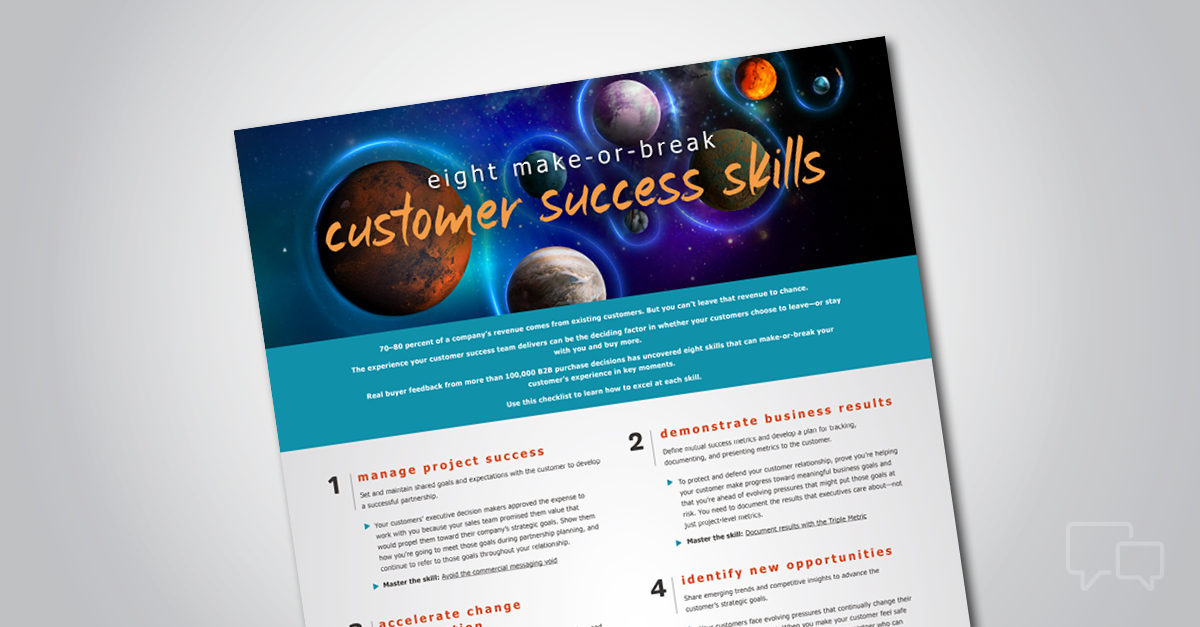
chevron
energy
Chevron Corporate is an energy company headquartered in San Ramon, California. The company is engaged in every aspect of the oil, natural gas, and geothermal energy industries, and is one of the world’s leading integrated energy companies.

the challenge
The real challenge wasn’t growth; it was complexity. Rapid growth brought new people and new issues into the sales process.
“We needed to figure out how to manage growth without losing focus, and how to leverage the approaches that helped us achieve our initial success,” said Bill Brockenborough, General Manager of Operations, Western Region. “Our business became more complex, with more people participating on the customer side and more people involved from our side. We’ve found that moving from a traditional two-party buyer-seller process to a multi-party sales process more than doubled the complexity.”
“We have a long selling cycle, with multiple stakeholders,” Emerson added. “We have to make a financial sale, a technical sale, and a political sale – all at the same time. We’re in a competitive market, and our customers have other alternatives. It takes coordination within our teams and with our customers to get the job done right.”
Not surprisingly, rapid growth led to an increase in CES staff size. This was, of course, good news, but it added even more complexity. According to Brockenborough, “We couldn’t continue managing relationships with customers the old way that worked for single buyers and smaller contracts. With more new people on our staff – people who hadn’t been with us at the beginning – we had to take our communications, our organization, and our sales approach to the next level.”
Solution: CES sales leaders partnered with Corporate Visions to deploy a new and better approach to sales strategy execution, focused on a management-driven system to address Chevron’s unique challenges.
The focus, in particular, was on “pivotal agreements,” or the few critical agreements made with customers that can be vitally important turning points in a company’s sales process. The concept is a staple of Corporate Visions’ negotiations training programs. Examples of these agreements include:
- Access to key information early in the sales cycle to optimize the customer’s decision-making process and reduce complexity.
- Commitment to project sponsorship from an opinion leader inside the customer organization who could champion CES’s proposal through an often political approval process.
- Alignment on a jointly developed roadmap that describes the steps in the customer’s buying process, supported by mutually agreed-upon timelines.
Agreements like these, when well-crafted, are milestones on the path to larger customer relationships and higher levels of customer satisfaction.
According to Emerson, this was a critical insight: “We realized that we were making agreements constantly with customers, and that if we got a few early agreements wrong, we would lose opportunities to provide full value. If we didn’t plan for agreement execution, we would end up with bad outcomes for us and our customers: delays, lost opportunities, reduced scope of work, and misfires with customers without a second chance.”
Once these Pivotal Agreements were identified, the organization deployed Corporate Visions’ sales execution methodology. The goal: equip CES sales staff, operations staff, and managers to execute those agreements during the sales and project implementation process. Sales and operations teams participated in off-site workshops; managers also took part in semi-annual management meetings where the new approach was embedded into the CES sales management process. This approach had another important benefit: better sales management. According to Brockenborough, “The idea of Pivotal Agreements gave us a more granular view of the sales process. It let us know in an objective way whether we were making progress. It made deal coaching discussions more objective, rather than based on the subjective opinions of sales team members. It gave managers an easy-to-use framework for planning important sales calls, debriefing after customer meetings, and determining if we had really made progress.” Emerson concurs: “In the past, we managed to a five-step sales process. Now we are looking at executing two or three Pivotal Agreements per step, tied to how our customer buys. This helps us show the customer that we’re organized about how we move through the process, adding value at every step.”
the methodology
CES embedded Corporate Visions’ skills training methodology into its sales management system. Below are some of the foundational practices CES implemented to build more discipline into the way the company’s sales management leverages CES’s investment in the program:
- Extending the implementation as widely as possible — CES invited sales and operations staff and representatives from legal, finance, human resources, and senior management to participate in the initiative.
- Built it into the performance management system — CES built Corporate Visions’ approach into formal goals for managers. According to Emerson, “We require the use of the tools on certain types of projects; we also require that our managers reward the use of those tools on a regular basis, and demonstrate that they are putting processes in place to drive their adoption on their teams.”
- Reward and recognize performance — CES provides visible positive feedback and rewards for sales and operations personnel who demonstrate use of execution methodology with their customers.
- Extending the implementation as widely as possible — CES invited sales and operations staff and representatives from legal, finance, human resources, and senior management to participate in the initiative.
- Share successes — CES regularly devotes time to team meetings to storytelling about successful use of methodology. This led to the sharing of success stories more widely inside Chevron and increased momentum for the initiative.
- Provide regular reinforcement — CES follow up on its initial first-year deployment of the program with annual brush-up programs for sales teams and their managers.
- 95 percent of participants in the program say they will immediately use the skills they learned.
- Ability to implement larger, more complex projects at a higher success rate with much less margin erosion.
- Faster lead cycle times.
meet our customers

The world’s leading organizations work with Corporate Visions to learn how to





